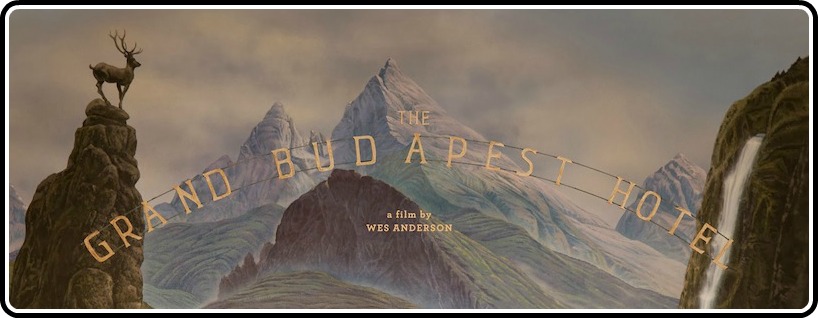
I seriously don’t understand the people who cherry-pick between the Wes Anderson movies they like and don’t like. This isn’t to say that Anderson himself lacks originality between projects or shows some kind of limited range, but rather that he is perhaps the most singular American auteur whose distinct aesthetic provides the unifying lifeblood of each movie he makes. Comments like “this is the most Wes Anderson of Wes Anderson movies” are regularly leveled at him as if it were a bad thing, but such “criticism” is rendered meaningless because of Anderson’s resolute (or stubborn, depending how you view things) habit of sticking to his own unique sense of the world—or his world. He’s the type of guy you need to be completely for or against, because anything in between just makes you look silly.
And now comes The Grand Budapest Hotel, a confectionary caper of the highest order that is at times his most fun and most solemn film; one filled with a seemingly unrivaled cast of colorful characters (including but not limited to Adrien Brody, Willem Dafoe, Jeff Goldblum, Jude Law, Harvey Ketiel, Bill Murray, Edward Norton, Saoirse Ronan, Tilda Swinton, Tom Wilkinson, and newcomer Tony Revolori) and bygone eras that never were but could have been. In short, Wes Anderson is eight feature films into his career and he’s made his best yet.
Told in a nested-narrative structure, the film begins in the present day as a teenage girl approaches a cemetery memorial to “Author,” the writer of a book she carries called “The Grand Budapest Hotel.” She begins reading a chapter and we are told the story within the book by Author himself, chronicling the time in the 1960s he encountered the crumbling hotel’s elderly owner, Zero Moustafa (in this timeline played by F. Murray Abraham), who then tells the Author the story about how he came to own the then-illustrious hotel and the unwilling adventure he once had with its dandy of a concierge, Monsieur Gustave H. (the delightfully charming Ralph Fiennes).
The potentially confusing narrative shifts are handled by superficially changing aspect ratios—widest for the more contemporary scenes and the boxy Academy ratio for the older ones—but handled even more deftly by superb art direction that subtly conveys historically relevant details like the drab, Communist inspired façade of the hotel in the 60s and the wonderfully ornate pre-WWII splendor of it in its prime. As a man whose films are known for their meticulously beautiful design, The Grand Budapest Hotel offers up what are the most beautiful and most dynamic designs.
The film’s sense of the progression and regression of time also carries on the fascinating theme of storytelling for Anderson’s oeuvre. When his films haven’t been outright performative (Rushmore) they’ve always had a novel approach both literally (The Royal Tenenbaums / Fantastic Mr. Fox) and figuratively (The Life Aquatic), and yet Grand Budapest cleverly pulls together all of those narrative intricacies into the funniest histrionic observations about the passage of time and memory I could think of. For every heartfelt dramatic beat Anderson’s script sets in, there’s almost always witty aside or screwball scenario to move the plot along. And yet this isn’t to say that the film is all plot and nothing more substantial—another tiresome criticism endlessly thrown at Anderson with every film he makes—in fact these seemingly unrecognizable characters give us a tragic sense of sincerity despite the artifice. They are fully realized people and yet still fall within Anderson’s idiosyncrasies.
Anderson has given us a fairy tale, and yet it resonates in its relation to real life on top of the sharp characterization. The encroaching specter of something resembling World War II pervades the adventure and provides a dramatic weight never before seen in an Anderson film.
Wes Anderson is an all or nothing type of auteur. You either give yourself over to his cinematic feasts of creation or you nitpick until your gripes become meaningless. Luckily for us people who are willing to go with the flow, Anderson has continued to challenge and mold those sensibilities to new heights, and The Grand Budapest Hotel is pretty high up there.



![Bergman Island (The Criterion Collection) [Blu-ray]](https://criterioncast.com/wp-content/uploads/2022/11/bergman-island-the-criterion-collection-blu-ray-400x496.jpg)
![This Is Not a Burial, It’s a Resurrection (The Criterion Collection) [Blu-ray]](https://criterioncast.com/wp-content/uploads/2022/11/this-is-not-a-burial-its-a-resurrection-the-criterion-collection-blu-ray-400x496.jpg)
![Lars von Trier's Europe Trilogy (The Criterion Collection) [The Element of Crime/Epidemic/Europa] [Blu-ray]](https://criterioncast.com/wp-content/uploads/2022/11/lars-von-triers-europe-trilogy-the-criterion-collection-the-element-of-400x496.jpg)
![Imitation of Life (The Criterion Collection) [Blu-ray]](https://criterioncast.com/wp-content/uploads/2022/11/imitation-of-life-the-criterion-collection-blu-ray-400x496.jpg)
![The Adventures of Baron Munchausen (The Criterion Collection) [4K UHD]](https://criterioncast.com/wp-content/uploads/2022/11/the-adventures-of-baron-munchausen-the-criterion-collection-4k-uhd-400x496.jpg)
![Cooley High [Criterion Collection] [Blu-ray] [1975]](https://criterioncast.com/wp-content/uploads/2022/11/cooley-high-criterion-collection-blu-ray-1975-400x496.jpg)